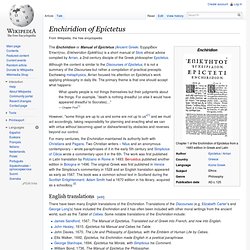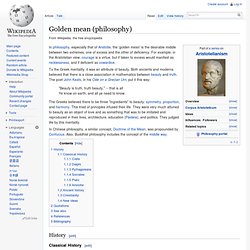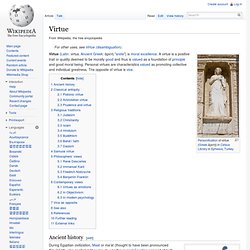

Enchiridion of Epictetus. The Enchiridion or Manual of Epictetus (Ancient Greek: Ἐγχειρίδιον Ἐπικτήτου, Enkheirídion Epiktḗtou) is a short manual of Stoic ethical advice compiled by Arrian, a 2nd-century disciple of the Greek philosopher Epictetus.

Although the content is similar to the Discourses of Epictetus, it is not a summary of the Discourses but rather a compilation of practical precepts. Eschewing metaphysics, Arrian focused his attention on Epictetus's work applying philosophy in daily life. The primary theme is that one should accept what happens: What upsets people is not things themselves but their judgments about the things. For example, "death is nothing dreadful (or else it would have appeared dreadful to Socrates) However, "some things are up to us and some are not up to us"[1] and we must act accordingly, taking responsibility for planning and enacting what we can with virtue without becoming upset or disheartened by obstacles and reverses beyond our control.
The golden verses of Pythagoras. Golden mean (philosophy) To the Greek mentality, it was an attribute of beauty.

Both ancients and moderns believed that there is a close association in mathematics between beauty and truth. The poet John Keats, in his Ode on a Grecian Urn, put it this way: "Beauty is truth, truth beauty," -- that is all Ye know on earth, and all ye need to know. The Greeks believed there to be three "ingredients" to beauty: symmetry, proportion, and harmony. This triad of principles infused their life. In Chinese philosophy, a similar concept, Doctrine of the Mean, was propounded by Confucius.
Another early elaboration is the Doric saying carved on the front of the temple at Delphi: "Nothing in Excess" ("Meden Agan"). Socrates teaches that a man "must know how to choose the mean and avoid the extremes on either side, as far as possible. " In education, Socrates asks us to consider the effect of either an exclusive devotion to gymnastics or an exclusive devotion to music. Hagakure. Cover of The Book of the Samurai Hagakure (Kyūjitai: 葉隱; Shinjitai: 葉隠; meaning Hidden by the Leaves or hidden leaves),[1] or Hagakure Kikigaki (葉隠聞書?)

Is a practical and spiritual guide for a warrior, drawn from a collection of commentaries by the samurai Yamamoto Tsunetomo, former retainer to Nabeshima Mitsushige, the third ruler of what is now Saga prefecture in Japan. Tsuramoto Tashiro compiled these commentaries from his conversations with Tsunetomo from 1709 to 1716; however, it was not published until many years afterwards. Hagakure is also known as The Book of the Samurai, Analects of Nabeshima or Hagakure Analects. Content[edit] The book records Tsunetomo's views on bushido, the warrior code of the samurai. Historical context[edit] After his master died, Tsunetomo himself was forbidden to perform junshi, a retainer's ritual suicide, by an edict of the Tokugawa Shogunate combined with his master's disapproval of the tradition.
Character Strengths and Virtues (book) The strengths and virtues[edit] CSV defined character strengths as satisfying most of the ten following criteria.

Character strengths are The introduction of CSV suggests that these six virtues are considered good by the vast majority of cultures and throughout history and that these traits lead to increased happiness when practiced. Notwithstanding numerous cautions and caveats, this suggestion of universality hints that in addition to trying to broaden the scope of psychological research to include mental wellness, the leaders of the positive psychology movement are challenging moral relativism and suggesting that virtue has a biological basis.[1] These arguments are in line with the Science of morality. Virtue.
Ancient history[edit] Classical antiquity[edit] Platonic virtue[edit] The four classic Cardinal virtues are:[4] This enumeration is traced to Greek philosophy and was listed by Plato in addition to piety: ὁσιότης (hosiotēs), with the exception that wisdom replaced prudence as virtue.[5] Some scholars[6] consider either of the above four virtue combinations as mutually reducible and therefore not cardinal.

Aristotelian virtue[edit] Prudence and virtue[edit] Seneca, the Roman Stoic, said that perfect prudence is indistinguishable from perfect virtue. Religious traditions[edit] Judaism[edit] Loving God, and obeying his laws, in particular the Ten Commandments are central to Jewish conceptions of virtue.